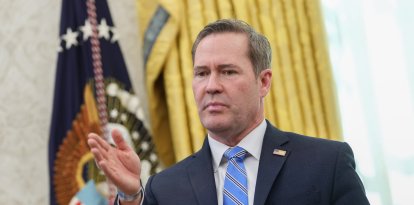Does Obamacare harm the sick? The opinion of a leading economist
John C. Goodman, former National Center for Policy Analysis (NCPA) director, recently explained the negative effects of the former Democratic president's monumental legislation.

President Barack Obama, Vice President Joe Biden, and senior staff applaud in the Roosevelt Room of the White House, as the House passes the health care reform bill, March 21, 2010. (Official White House Photo by Pete Souza)..This official White House photograph is being made available only for publication by news organizations and/or for personal use printing by the subject(s) of the photograph. The photograph may not be manipulated in any way and may not be used in commercial or political materials, advertisements, emails, products, promotions that in any way suggests approval or endorsement of the President, the First Family, or the White House.
In March 2010, then-President Barack Obama signed into law perhaps his most consequential legislative success, the Affordable Care Act, better known by its pseudonym, Obamacare. As the president promised repeatedly, thanks to his bill, those with pre-existing conditions would obtain quality and affordable health insurance. However, for a leading economist, the result has been quite the opposite.
John C. Goodman was director of the National Center for Policy Analysis (NCPA) and was dubbed by The Wall Street Journal as the "father of health savings accounts." In collaboration with Beverly Gossage, a state senator from Kansas, they wrote an article for the aforementioned media analyzing the consequences of the Obamacare legislation.
The opinion piece began with a strong statement, which states that "ObamaCare makes health insurance as good as possible for the healthy and as bad as possible for the sick." To explain their argument, the authors took as a fictional example a Dallas family, which they chose not to name.
This hypothetical middle-aged couple earns $70,000 a year and has two children who were born with severe birth defects. "Although this family will pay no premium for a Blue Cross bronze plan in the ObamaCare exchange, they will face a $9,100 deductible for each child. Their total out-of-pocket exposure is $18,200 a year," they explained.
In turn, since patients with serious illnesses often require care that is only available in certain health facilities, it will be very cumbersome for them to reach them. For this family, their Blue Cross plan is not accepted at major cancer providers nearby, including Baylor University Medical Center and the University of Texas Health Science Center, or MD Anderson Cancer Center in Houston.
"The problem is not unique to Texas. ObamaCare plans have very skinny networks in every state. They tend to pay providers Medicaid rates or close to them. As a result, ObamaCare looks like Medicaid with a high deductible. A great many providers, including prestigious medical institutions, won't accept Medicaid managed care — the version of Medicaid most recipients receive — or ObamaCare," they continued.
Goodman and Gossage also mentioned the implicit tax on earned income that the legislation entailed. Assuming the Dallas family earned just $60,000 annually, their children could qualify for CHIP (the Children's Health Insurance Program) or Medicaid, so they wouldn't be allowed to participate in a subsidized private exchange plan.
"Given their lower income, the best exchange plan the family would qualify for now would be the Blue Cross' silver plan, which carries zero premium. This means that if parents stay healthy, they would have no out-of-pocket medical expenses. But things change quickly if they rose to $70,000 household income again. The penalty would be an $18,200 increase in maximum medical costs— a marginal tax rate of 182%."
Even with children in CHIP, should the parents have any serious medical problems, the implied tax would still be present. "At an income, say, of $30,000, the best option is a silver plan with a small premium combined with a small deductible. But if your income doubles to $60,000, the out-of-pocket exposure will increase by $14,200. That's an implicit marginal tax increase of 47%," the article's authors wrote.
In conclusion, they claim that this Dallas family would be much better off with the pre-Obamacare healthcare system, as there were reasonable deductibles and networks that covered nearly all doctors and medical facilities. At the same time, there was a risk pool in Texas, dedicated to those who delayed the purchase of a plan until they really needed it.
What causes these problems in Obamacare?
Goodman and Gossage are clear, that the key is in the authorship of the legislation, which was not drafted by either the Democrats in Congress or by Obama himself.
"It was designed by special interests. ObamaCare has been pouring about $60 billion a year into new money into the health care system. All that spending is lining the pockets of insurance companies, hospitals and some doctors— although it doesn't appear that there has been an overall increase in the amount of healthcare being delivered," they concluded.
RECOMMENDATION





















